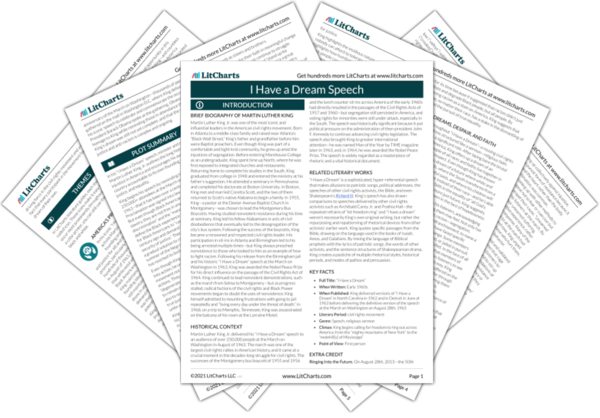Throughout “I Have a Dream,” heat symbolizes the stifling and intolerable nature of racism. Martin Luther King Jr. first refers to the “sweltering summer of the Negro’s legitimate discontent” early on in his speech. The March on Washington took place in August of 1963, so this is in part a reference to the summer heat that the audience was enduring as they listened to King deliver his speech. But when he describes a “sweltering summer” of justified anger, he’s describing how Black Americans have spent centuries suffering through the “heat” of racism. He uses this metaphor in many places in the speech, describing Mississippi, for instance, as “a state sweltering with the heat of injustice [and] oppression.”
As King continues to envision his dream for social and racial justice in America, he describes an “oasis of freedom and justice”—an oasis being a cool place where one might find respite from a hot desert. Comparing freedom and justice to an oasis suggests that fighting to make freedom and justice a reality for Black Americans will help break the “heat” from which the country currently suffers. The imagery of heat breaking due to the successes of the civil rights movement is also apparent in King’s description of an “invigorating autumn of freedom and equality” ending the horrific summer heat. The contrasting imagery of heat and cool throughout the speech helps the audience understand that they can only be comfortable in America once the fight for civil rights has been won. If anyone wants a break from racism—or, metaphorically, from the oppressive August heat—they need to help make the “invigorating autumn of freedom and equality” a reality.
Heat Quotes in I Have a Dream Speech
This sweltering summer of the Negro’s legitimate discontent will not pass until there is an invigorating autumn of freedom and equality.










